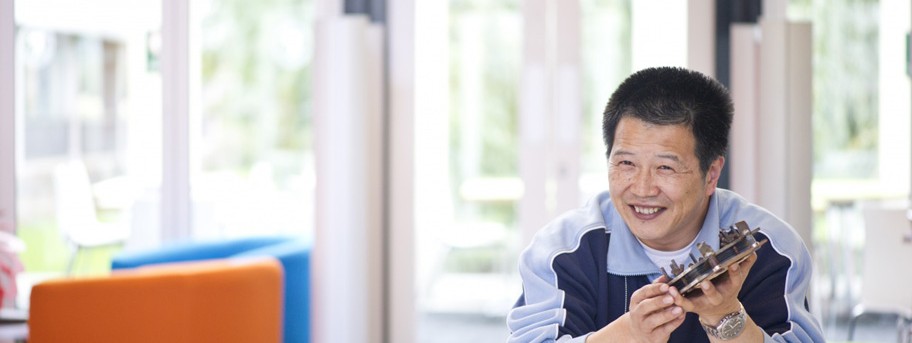The University of Nottingham
 Exchange online
Exchange online
Research Exchange
University to develop ‘super batteries’ with E.ON

The University is working with E.ON to develop a next generation ‘super battery’ which will enable households and businesses to benefit from clean, cheap and powerful energy storage.
The contract with the University to develop the new energy storage device (known as a supercapattery) is one of three research projects amounting to a total of £1 million that E.ON is sponsoring, which aim to improve energy storage technologies and energy efficiencies for businesses and households.
The largest of the three projects that the University is undertaking with E.ON is the development of the supercapattery technology. A supercapattery combines the power of qualities of a supercapacitor with the energy storage benefits of a battery, and does so at a low price. Made from carbon nanotubes chemically engineered with advanced battery materials, the supercapattery has a variety of applications ranging from powering portable electronics such as notebook computers, to using arrays of supercapatteries which would offer large scale energy storage solutions for power companies.
Supercapatteries can also be brought into action at very short notice to provide the additional power required, and the crucial stability needed by the national grid, in the event of a national power surge.
Professor George Chen, who is leading on the supercapattery project for the University, said: “Typically, an extra five per cent of the power of the national grid is standing by in reserve in case of a surge, for example when everyone puts their kettle on after a football match has finished. It is very expensive to do this, and supercapatteries offer a more cost effective and environmentally friendly alternative.”
The second project of the three sees an investigation into the alternative use of batteries which are currently used in electric and hybrid cars as potential energy storage devices for homes. The project aims to develop an understanding of the potential benefits of batteries where households such as those which use solar power for instance, can harvest their own energy for later consumption, or else sell it on to the national grid at peak periods.
The final project with E.ON will focus on the study of various energy saving retrofits to the E.ON Research House, based at University Park, to help to gain a better understanding of how to save energy and reduce carbon emissions in the home. The E.ON Research House is a typical 1930s semi-detached house which will be incrementally upgraded to improve aspects such as insulation, glazing and energy storage. The project will also test out innovative new technologies that aren’t commercially available, which could become an important part of future retrofit solutions in homes.
Dr Stephan Ramesohl, Vice President Innovation Portfolio Management at E.ON, said: “The University of Nottingham brings new technical ideas and solutions to E.ON’s Technology and Innovation projects. Our successful relationship is helping us deliver cleaner and better energy in a complex and changing energy landscape.”
Speaking about the work with E.ON, Mike Carr, the University’s Director of Business Engagement, said: “These collaborations between the University and E.ON are very exciting. We have a great depth of knowledge in the energy sector and this research will undoubtedly result in new energy technologies and management systems being developed to respond to the evolving needs of the energy sector.
“The University of Nottingham has great strengths and expertise in a range of sectors including energy, aerospace, engineering, food and pharmaceuticals. We always welcome the opportunity to speak to businesses that have ideas they would like to explore with us.”
For more information about the University of Nottingham’s services for business, visit www.nottingham.ac.uk/servicesforbusiness or email beis@nottingham.ac.uk
Leave a Reply
Other News

Top prize for quantum physicist
A University of Nottingham physicist has won a prestigious medal from the Institute of Physics for […]

Zero carbon HOUSE designed and built by students comes home
Design and construct a low cost, zero carbon, family starter home, transport it to Spain, build […]